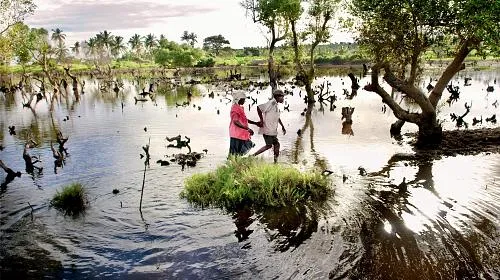Slow progress in tackling climate roadblocks on the path to a safer and poverty-free world
BONN, GERMANY (September 4, 2015) — The Arctic is melting, the world is getting hotter, and increasing natural disasters are forcing more and more people to flee their homes further escalating poverty and inequality across the world. Public support for climate action is growing globally, but the governments negotiating for a universal climate change agreement, due to be signed in Paris in December, are lagging far behind from what is needed, says CARE International, as the second to last round of UN climate talks before the Paris deadline conclude in Bonn, Germany.
“Failure to tackle climate change will only cause further damage to the poorest and most vulnerable people in the world,” says Sven Harmeling, CARE International’s climate change advocacy coordinator. “Climate change is a global injustice. Ahead of the Paris climate deal, countries have a historic opportunity to set the world on a zero-emission and poverty-free course.”
But progress in this week’s climate negotiations has been painstakingly slow. “Now is the time for ministers to step up the pace to ensure that the poorest people are not left alone to bare the catastrophic consequences of climate change,” Harmeling says.
CARE International calls upon global leadership to accelerate action towards an equitable climate deal. We can already see a positive shift away from fossil fuels to renewable energies. The Paris agreement must support this encouraging progress with a comprehensive climate package which has a strong focus on gender and human rights and includes adequate finance for developing countries to respond to loss and damage caused by climate change.
Media contact
Viivi Erkkila, Media and Communications Coordinator for CARE International’s Poverty, Environment and Climate Change Network
Email: verkkila@careclimatechange.org; Tel: +44 (0)7 7924 54130
About CARE
Founded in 1945, CARE is a leading humanitarian organization fighting global poverty. CARE has more than six decades of experience helping people prepare for disasters, providing lifesaving assistance when a crisis hits, and helping communities recover after the emergency has passed. CARE places special focus on women and children, who are often disproportionately affected by disasters. To learn more, visit www.care.org.

